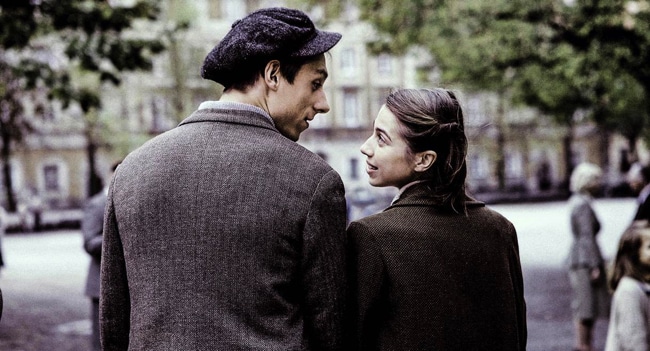
Dir: Jolanta Dylewska, Andrzej Wajda | Cast: Aleksandra Popławska, Adriana Kalska, Maria Dejmek, Maria Semotiok, Kamilla Baar Kochonska; Katarzyna Wajda, Mateusz Wajda, Patricya Rojecka, Julia Sierakwoska; Poland/Germany 2019, 79 min.
Jolanta Dylewska and veteran director Andrzej Wajda worked together on this wistful ‘behind the scenes’ story of cardiologist Marek Edelman, the last surviving leader of the Warsaw Ghetto uprising in 1943. Edelman talks to the camera about his recollections of love in the ghetto, the romantic vignettes re-imagined by actors and intercut with archive films from the 1940s and contemporary shots from the inside of the Ghetto.
Marek Edelman (1909-2009) was also a political activist in the Polish Solidarity movement, a founder member the Jewish Labour Youth organisation before the Second World War, and later in the Ghetto. He became a cardiologist after 1945, and continued to oppose Zionism after the war, writing a letter of Solidarity to the Palestinians.
His first affair involved Dola (Poplanska) who was a nurse at the Bersohn and Bauman hospital in Warsaw, where Edelman worked. One evening, she invited young Marek into a room, telling him she could inject both of them with morphine so that they could make love. Shy Marek, who was immune to morphine, excused himself, and ran away. Later, Dola met a “Volksdeutscher” (sort of second class German) called Jozefow, who worked for Germans in the Ghetto, and the two fell in love. Dola’s husband, the couple had been divorced for a long time, was suffering from Tuberculosis and Jozefow arranged for him to live in countryside, where he brought food, which Dola fed to the invalid, before making love to Jozefow.
Mrs. Tennenbaum was a doctor at the hospital, and was lucky to get “a white card” which meant, that she was safe (at least for the time being) from deportations to the death camps. But her seventeen-year-old daughter Deda had not such luck, and her mother committed suicide, instructing her colleges in writing not to resuscitate her, but give the White Card to her daughter. Her friends honoured her wish, but Deda fell in love with a young man, and whilst they were living outside the Ghetto, with an American nurse, their lovemaking was so boisterous, that informers betrayed them to the Germans. Edelman does not know, when they were deported.
Tosia was a young woman of very middle-class background. She fell in love with a health inspector, and got pregnant. They got caught up in a round-up, when she was in her sixth month. They were dragged to the “Collection Point” near the hospital, where the Jews were forced into the wagons before deportation to the death camps. An Estonian guard wanted to shot her, but her boyfriend put her hand on her belly. The guard shot through his hand, and he was later executed, but Edelman does not know where Tosia was killed.
Hindusia Himmelfarb (Sierakowska) looked like a model Aryan: she had long blond hair and blue eyes – but she went with the children in her charge to the gas chambers. Others gave her the chance to escape the Ghetto, but she could not leave the children. Edelman comments, that her sacrifice was greater than Dr. Korzak’s – because he was an old man and she a young woman.
Pola Lifszyc was a life puppeteer, who entertained 300 children twice a week, making them happy, transporting them into another world. But Pola was worried about her very sick mother. Her boyfriend Janek, who had a rickshaw, was with her, when she learned, that her mother had been taken to the “Collection Point”. She asked Janek to take her there, and he watched helplessly, as she jumped from the rickshaw and joined her mother entering the wagon.
Edelman was not just a bystander: he watched the deportations, and tried to save friends, which he dragged out of lines into the back windows of the hospital. One day, he was looking for his friend Zoria, whom had saved already three times. But on this particular day, a woman with diamonds, asked him, to save her daughter. “I was tempted, because the diamonds meant, that I could save more people”. But Edelman decided against it, and waited for Zoria – but he failed to save her his time.
There was love in the Ghetto is heart breaking, because there are no happy endings. And we can imagine Edelman staying at the gate of the “Collection Point” to wait for friends he would try to save. The three levels work very well together: particularly the re-enactments in the contemporary Ghetto hit very much home: it could happen today. AS
Screening at KINOTEKA | The Polish Film Festival in London, Kinoteka.org.uk